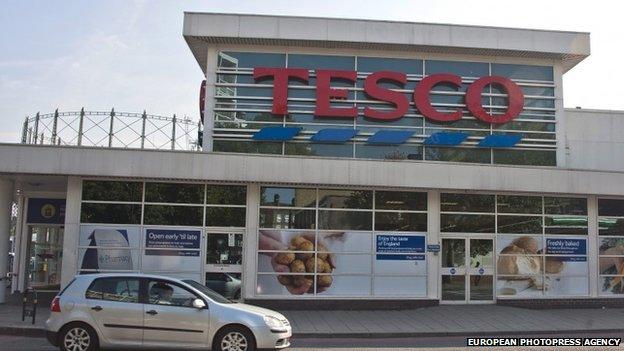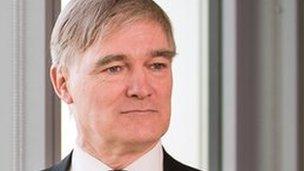Tesco investors put Sir Richard Broadbent in the frame
- Published
- comments

Day two, and Tesco's share price is again drifting south, down almost 5% and now below £2 (a number the retailer hasn't seen since 2003).
The latest trading figures from Kantar show sales down another 4.5% in the 12 weeks to 14 September. It seems to be a race between trading figures and the share price as to which can fall the fastest.
Sir Richard Broadbent, the chairman, has said that it will be up to investors to decide whether he is ultimately seen as part of the solution or part of the problem.
After speaking to four of the top twenty investors in Tesco - the people who actually own the business - there is certainly a very negative and gloomy tone.
Investors list three key areas of concern - governance problems within the business, lack of retail experience on the board and an overly aggressive internal culture which one investor said that the board had been "too slow" to tackle.
The areas of concern suggest that Sir Richard will have a lot of persuading to do that he is, indeed, the solution.
In the short term, the investors I have spoken to believe, Sir Richard will survive. The major changes at the top - with a new chief executive and new chief financial officer - mean that Sir Richard is one of the few people with any institutional knowledge left.

Sir Richard was appointed as chairman in May 2011
Under control?
But the very fact there has been such a shake-up led one investor to question whether the board had the correct "grip" on succession planning. Until Tuesday's announcement that Alan Stewart was joining early from Marks and Spencer, Tesco didn't have a chief financial officer.
Another very large investor said that he was "shocked but not surprised" at the announcement of the accounting problems yesterday.
And he pointed to page 34 in the 2014 Annual Report where the board was warned by its external auditors, PwC.
"The Committee notes that commercial income was an area of focus for the external auditors based on their assessment of gross risks," the annual report says.
But it seems that the audit committee decided that everything was under control.
Early warnings
"It is the Committee's view that whilst commercial income is a significant income for the Group and involves an element of judgement, management operates an appropriate control environment which minimises risks in this area.
"As a result, the Committee does not consider that this is a significant issue for disclosure in its report."
The investor said that the board had clearly "been warned" about the problem and expressed frustration that more action had not been taken.
Analyst notes raising concerns about the treatment of supplier income and earnings had also come from, among others, Cantor Fitzgerald and Bernstein Research.
Tesco told me on Tuesday that there could be two explanations for the original clean bill of health. Either the behaviour was not happening at the time or it was buried very deep in the internal workings of Tesco.
It therefore needed a whistleblower to identify it - which is what happened yesterday, proving that the internal systems do work.
Allies of Sir Richard say that he has acted robustly in the face of very tough circumstances.
Tesco has sold its troubled business in America, has tackled problems in China, has removed the group chief executive, Philip Clarke, and has announced problems as soon as possible to the stock market and put in place mechanisms to deal with the issues.
But investors believe that, with a new chief executive with no direct retail experience, someone at the top who knows the sector well would be advisable.
One name regularly mentioned is Archie Norman, the present chairman of ITV. Mr Norman was the man credited with creating the modern Asda where he was chief executive and chairman in the 1990s.
Sir Richard might not quite be in the departure lounge. But from what I have been told today, there is no guarantee that investors see him as the long term solution to Tesco's problems.